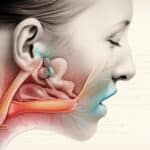Nasal Polyps and Tinnitus: Unearthing the Surprising Connection
- Get link
- X
- Other Apps
Introduction
Tinnitus and nasal polyps are two seemingly unrelated conditions. However, we unveil a surprising connection between these two. Here’s an in-depth exploration that not only diagnoses them separately but also investigates their relationship.
If you’ve been experiencing a constant, annoying ringing or buzzing sound in your ear, you know the effects of tinnitus. Now, couple that with something as mundane as nasal polyps. Weird combination, right? Not so fast. These two may seem unrelated, but they might have a stronger connection than you think. This article dives into nasal polyps, tinnitus, and the unexplained link between the two. So, buckle up for a ride that may just give you some clarity.
Understanding Nasal Polyps
Do you recall those gelatinous blobs plaguing your peaceful nostrils in the cold months? Those are nasal polyps – soft, painless, noncancerous growths on the lining of your nasal passages. They can vary in size, from the size of a bean to as large as a grape. They occur due to inflammation from asthma, infection, or allergy. Symptoms include a runny or stuffed nose, snoring, or a loss of smell and taste. Over-the-counter medication or steroids are common treatments. However, if these treatments don’t work, surgery might be the answer. There are several home remedies available as well that can help alleviate the symptoms. Discover more about these home remedies for tinnitus.
Understanding Tinnitus
Tinnitus, pronounced as tin-NY-tus or TIN-ni-tus, is an auditory nuisance culminating in your perception of noise or ringing in the ears. While not a condition itself, it’s a symptom of other underlying conditions. These include age-related hearing loss, ear injury, or circulatory system disorders. Its main symptom, a phantom ringing in your ear, is common in people over age 65. Treatment centers around resolving the root issue. However, for some, that issue remains a mystery. For others, tinnitus can improve with treatment. Delve into a more detailed understanding of tinnitus and its remedies. You may also want to explore the role of CBD in treating tinnitus.
The Connection between Nasal Polyps and Tinnitus
Now, let’s dig deeper into the surprising association lurking between nasal polyps and tinnitus. Nasal polyps, by swelling and obstructing the nasal and sinus passages, can, in rare cases, cause or exacerbate tinnitus. But how? Well, the obstruction can potentially impact fluid drainage from the ears; causing pressure changes that might indeed instigate or intensify tinnitus. Furthermore, allergens causing nasal polyps may also affect the Eustachian tube, leading to blockage and ultimately tinnitus. It’s crucial at this juncture to make you aware that the medical community is still grappling with unraveling this mysterious connection. Some pivotal research, however, like this study on the role of Vitamin B12 and the use of doTERRA oils in the treatment of tinnitus, are worthwhile reads.
Can Sinus Polyps Cause Tinnitus?
You might wonder, “Could sinus polyps cause tinnitus?”. While not a mainstream consensus, some anecdotal accounts and studies indicate a potential link. Sinus polyps can cause blockages, affecting normal sinus functioning and disrupting Eustachian and ear tube regulation. This can lead to tinnitus. Resolving sinus problems could help mitigate tinnitus symptoms. If you’re intrigued further, allow us to suggest this resource about Ginkgo Biloba’s role in tinnitus treatment and how CBD gummies could potentially help.
Nasal Polyps, Ear Ringing, and Tinnitus
To appreciate how nasal polyps might lead to ear ringing or tinnitus, it’s important to understand the mechanism of hearing. Our ears adjust to the continuous flow of air. When nasal polyps cause blockages, fluid builds up within the ear canals. The resulting pressure change may aggravate or even trigger tinnitus. Additionally, large nasal polyps near the Eustachian tubes might apply pressure and intensify the ringing sound. For an enriched understanding, we’d suggest reading up on a herbal remedy for tinnitus and the potential use of helichrysum essential oil.
Treatment Options for Nasal Polyps-Induced Tinnitus
Treating tinnitus brought on by nasal polyps revolves around addressing the base problem – the nasal polyps. Smaller polyps might respond to corticosteroid nasal sprays or drops. In more severe cases, endoscopic sinus surgery might remove larger polyps to alleviate the symptoms. Addressing tinnitus involves a varying approach; it could range from sound therapy, and cognitive-behavioral therapy (CBT), to tinnitus-retraining therapy (TRT). Nourishing the body with essential vitamins and nutrients like zinc could potentially assist in managing tinnitus. Also, incorporating a sleep aid like melatonin could mitigate tinnitus-related sleep disturbances. Don’t overlook the simple respite encompassed in ear drops, which could provide some relief.
Prevention and Management
While nasal polyps and tinnitus may not be entirely preventable, proactive steps can help manage them. Regular gargling with a saline solution can keep nasal passages clear. Keep allergies under control with appropriate medication as they can aggrieve nasal polyps. For tinnitus, avoid known triggers such as loud noises and stress. Regular physical activity encourages better blood circulation, which could alleviate tinnitus symptoms. Finally, it’s essential to have regular check-ups with an ENT specialist if you’re prone to nasal polyps or tinnitus.
Conclusion
Unraveling the connection between nasal polyps and tinnitus helps clarify the understanding of these two seemingly disparate ailments. The correlation, while still a subject of ongoing research, offers insightful perspectives regarding diagnosis and treatment. It’s crucial to remember that while this connection might be a revelation to many, it forms only one piece of the jigsaw in understanding and managing tinnitus. Regular medical consultation, individual body awareness, and a proactive approach toward prevention are key to managing nasal polyps and tinnitus. We hope this discussion has provided some valuable insights and broadened your understanding of nasal polyps and tinnitus.
Nasal Polyps And Tinnitus - Frequently Asked Questions (FAQ)
Nasal polyps are soft, noncancerous growths on the lining of your nasal passages or sinuses. They originate from chronic inflammation due to asthma, recurring infection, allergies, drug sensitivity or certain immune disorders.
Tinnitus is the perception of noise or ringing in the ears. It’s a common problem that affects about 15 to 20 percent of people. It’s usually the symptom of an underlying condition, such as age-related hearing loss, ear injury or a circulatory system disorder.
The connection between nasal polyps and tinnitus is not well-defined but is offered some support from anecdotal evidence and few clinical studies. Nasal polyps can block sinuses and disrupt normal functioning, which may result in tinnitus.
There is some evidence to suggest that sinus polyps, by causing blockages, can lead to conditions that result in tinnitus. However, it’s not a mainstream consensus, and more research is required to conclude definitively.
The primary treatment for tinnitus induced by nasal polyps aims at combating the root cause, which is the nasal polyps. Depending on the severity, treatments may include corticosteroid nasal sprays, drops, or surgery. Simultaneously, dealing with tinnitus can range from sound therapy, cognitive-behavioral therapy, to tinnitus-retraining therapy.
The post Nasal Polyps and Tinnitus: Unearthing the Surprising Connection appeared first on Pulsatile Tinnitus Treatments News - Tinnitus Relief.
Related posts:
https://ift.tt/vjeKmnt
#tinnitus #pusatiletinnitus #earringing #whatistinnitus #howtostoptinnitus
- Get link
- X
- Other Apps



Comments
Post a Comment